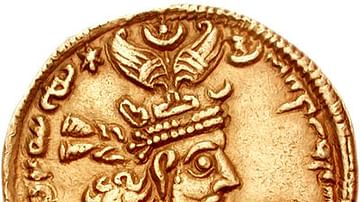Search
Search Results

Definition
Suleiman the Magnificent
Suleiman the Magnificent (aka Süleyman I or Suleiman I, r. 1520-1566) was the tenth and longest-reigning sultan of the Ottoman Empire. Hailed as a skilled military commander, a just ruler, and a divinely anointed monarch during his lifetime...

Definition
Ancient Syria
Syria is a country located in the Middle East on the shore of the Mediterranean Sea and bordered, from the north down to the west, by Turkey, Iraq, Jordan, Israel, and Lebanon. It is one of the oldest inhabited regions in the world with archaeological...

Definition
Sasanian Empire
The Sasanian Empire (224-651 CE, also given as Sassanian, Sasanid or Sassanid) was the last pre-Islamic Persian empire, established in 224 CE by Ardeshir I, son of Papak, descendant of Sasan. The Empire lasted until 651 CE when it was overthrown...

Definition
Oyo Empire
The Oyo Empire flourished from the 17th to 19th century CE in what is today southwest Nigeria. The Oyo forged an empire thanks to their formidable cavalry units and so came to dominate other Yoruba peoples of the region. The Oyo Empire, with...

Definition
Mauretania
Mauretania was an ancient kingdom in northwest Africa, encompassing regions of modern-day Morocco and Algeria. Although it shares a name with the modern country of Mauritania, they do not overlap. Ancient Mauretania was named after the Mauri...

Definition
Estado da India
The Estado da India (1505-1961) was the name the Portuguese gave to that part of their empire which stretched from India to East Asia. However, in its widest sense, the name includes all Portuguese colonies east of the Cape of Good Hope and...

Definition
Persian Literature
Persian literature differs from the common definition of “literature” in that it is not confined to lyrical compositions, to poetry or imaginative prose, because the central elements of these appear, to greater or lesser degrees, in all the...

Definition
Kingdom of Kanem
The Kingdom of Kanem (aka Kanim) was an ancient African state located in modern-day Chad, which flourished from the 9th to 14th century CE. With its heartland in the centre of the African continent on the eastern shores of Lake Chad, the...

Definition
Western Astrology
Western astrology refers to a form of divination based on the motion of astronomical objects such as stars or planets. The belief that astronomical objects are divine or influence events on Earth is found in many cultures, but the practices...

Definition
Khosrow II
Khosrow II (aka Kosrau II, r. 590-628) was the last powerful shahanshah (king of kings) of the Sassanian Empire. Grandson of Kosrau I (r. 531-579) and near-conqueror of the Byzantine Empire in the Byzantine-Sassanian War of 602-628, Khosrow...